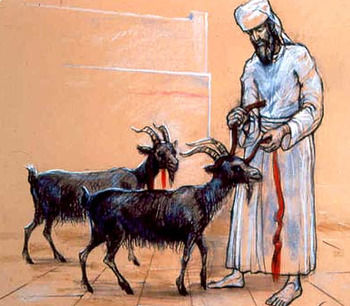This week's 10-Minute Torah (April 30, 2022): "Parashat Acharei Mot" 5782
- Rabbi Stephen Epstein

- Apr 21, 2022
- 2 min read

Parashat Achrei Mot 5782 / פָּרָשַׁת אַחֲרֵי מוֹת
30 April 2022 / 29 Nisan 5782 (Diaspora)
Parashat Achrei Mot is the 29th weekly Torah portion in the annual Jewish cycle of Torah reading.
Torah Portion: Leviticus 16:1-18:30 https://tikkun.io/#/r/3-16-1
Achrei Mot (“After The Death”) opens by describing the ritual service of Yom Kippur, the Day of Atonement. It then details the prohibitions of offering sacrifices outside of the Mishkan (Tabernacle) and of eating animal blood, and ends with a list of forbidden sexual relations.
Triennial year 3
1: 17:1-7 · 7 p’sukim ·
2: 17:8-12 · 5 p’sukim ·
3: 17:13-16 · 4 p’sukim ·
4: 18:1-5 · 5 p’sukim ·
5: 18:6-21 · 16 p’sukim ·
6: 18:22-25 · 4 p’sukim ·
7: 18:26-30 · 5 p’sukim ·
maf: 18:26-30 · 5 p’sukim ·
Haftarah for Ashkenazim*: I Samuel 20:18-42 · 25 p’sukim *Shabbat Machar Chodesh
Parashat Aharei Mot (or just Aharei in some Humashim) contains two portions that are read on Yom Kippur. During the morning Torah reading, we read Leviticus 16:1-34 which discusses the procedure by which the Cohen Gadol, High Priest, make expiation or repentance for the congregation of Israel. This is the obvious choice.
The afternoon reading is from the same portion and is Leviticus Chapter 18, which discusses forbidden relationships. This choice may not seem as obvious. How is the chapter that admonishes Israel from engaging in relationships with specific relatives related to our most solemn Holy Day in which we seek contrition for our sins?
First of all, let’s consider the times in which this was first presented. Paganism and idolatry was rampant and the ancient peoples engaged in all sorts of deviant sexual practices, among other things. They gave in to their temptations and in many cases reveled in it. Yom Kippur addresses this by having us practice restraint. The most evident example is abstaining from food and drink for twenty-six hours. But also, Hashem has given us a path to direct our urges to socially healthy means.
This also reminds us that the family is the most basic unit of society. Without a positive family to instill proper morals and ethics, society falls down. We need to get along with each other and practice trust and respect so society can fulfill itself to the fullest. In that way, each of us has a better opportunity to fulfill ourselves and create a better world.












Comments